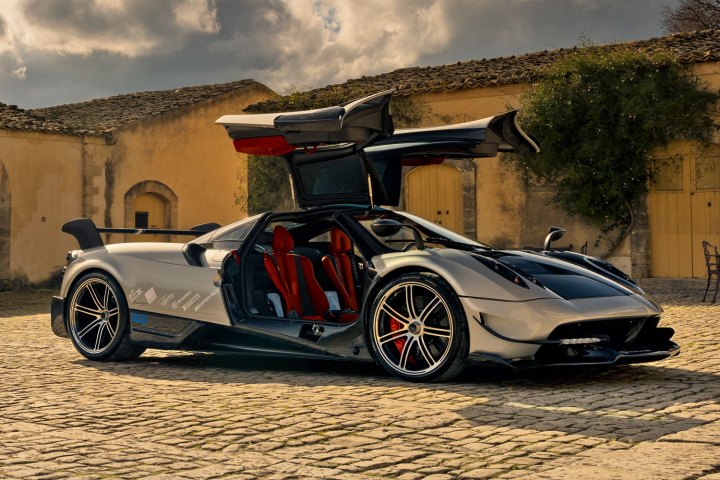
Pagani is Italy’s most extreme automaker. Its carbon-fiber creations make Ferrari and Lamborghini look tame, and Pagani’s supercars are much rarer than those of its more established rivals. Pagani is also about to do something Ferrari and Lamborghini have shied away from: Build an all-electric hypercar.
Horacio Pagani, the company’s founder and CEO, confirmed plans for an electric hypercar in an interview with Autocar. That car will share a basic platform with the successor to today’s Pagani Huayra, which is due in 2022. The electric version will be sold alongside a gasoline-powered model, Pagani said. But it may take a while for that car to show up.
Pagani plays by its own rules, including when it comes to model launches. The recently unveiled BC Roadster will ostensibly be the last iteration of the Huayra, paving the way for the new model (code-named C10) and its all-electric sibling. But Pagani’s previous hypercar — the Zonda — managed to avoid the Grim Reaper for years because customers still wanted it. Pagani only builds about 40 cars a year, according to Autocar, so if the same thing happens with the Huayra it may cause a backlog that could delay the launch of the successor car.
Horacio Pagani told Autocar that stricter emissions regulations and a changing customer base were factors in the shift to electric power. When the company started, most buyers were European car collectors in their 50s, he said. But now the average age of customers has dropped, and more of them tend to be from places like Silicon Valley, where tech is a bigger selling point, he said.
Pagani’s traditional V12 engines will stick around for now. The company gets these engines from Mercedes-AMG, and they are homologated for emissions through 2026, Horacio Pagani said. So the company will continue using them at least until then, he said.
The Pagani electric hypercar will have plenty of competition, mostly from other small firms. The 2,000-horsepower Lotus Evija is set to debut in 2020. Croatia’s Rimac has already built the 1,088-hp Concept One, and will soon follow that up with the Concept Two. The second-generation Tesla Roadster comes with bonkers numbers of its own, including a claimed zero to 60 mph time of 1.9 seconds, and a top speed of 250 mph. But most of these cars haven’t turned a wheel yet, so it’s unclear if they will live up to the hype.
Editors' Recommendations
- Genesis Neolun concept is an electric SUV inspired by tradition
- VinFast is bringing a mini electric SUV to the U.S., and maybe a pickup, too
- Cadillac aims to balance its lineup with a small electric SUV
- The fastest electric cars, ranked by 0-60 mph acceleration
- Lamborghini teases its first all-electric supercar ahead of Friday’s big reveal


